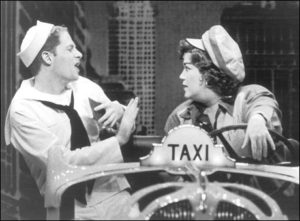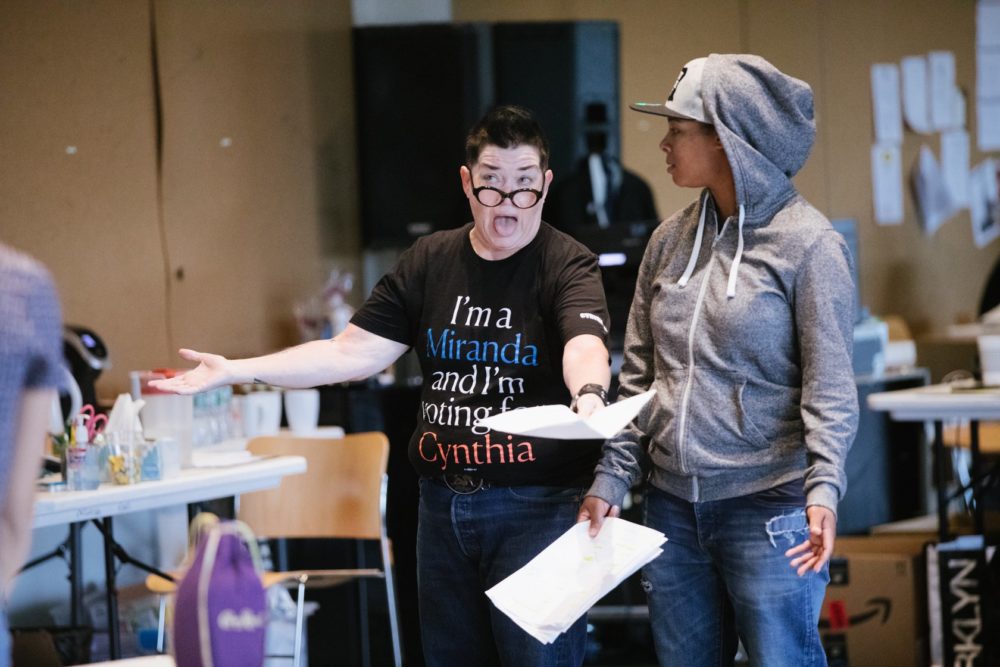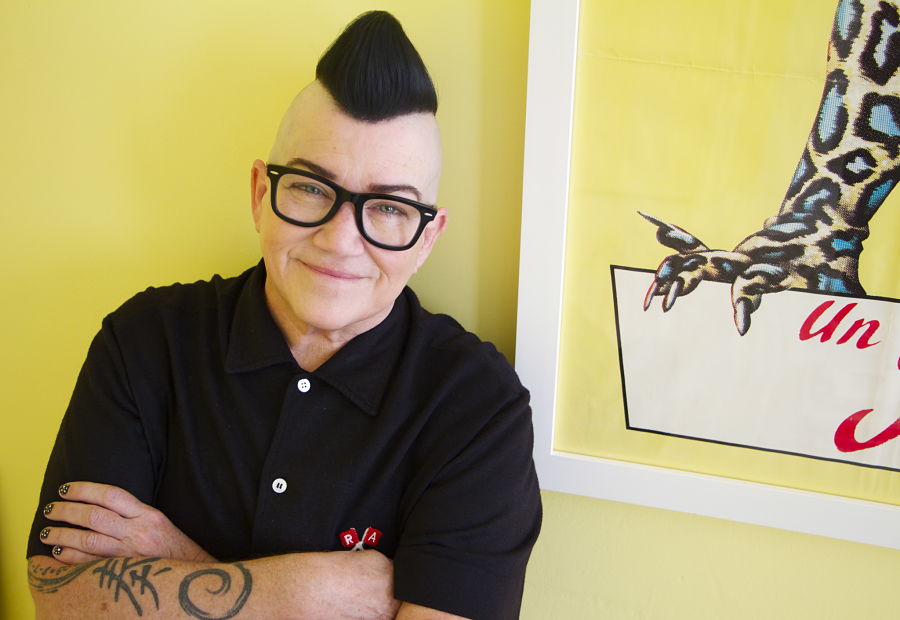When I recently sat down with Lea DeLaria to discuss her turn in MCC Theater’s production of Collective Rage: A Play in 5 Betties by Jen Silverman (Aug. 16-Sept. 23), I anticipated that we’d discuss the trajectory of her career and what it means to her as a butch lesbian to play a butch character in Collective Rage. As a lesbian and a theatre worker myself, I was excited to hear her perspective on the progression of queer representation in the industry. I’m so used to folks paying lip service to the progress theatre has made regarding queer representation that I naïvely expected the same from DeLaria.
But if you know anything about DeLaria (best known for playing Big Boo on Netflix’s “Orange Is the New Black”), you know she’s not one to sugarcoat things. Where I half-expected optimism, she gave me brutal honestly about just how far we haven’t come and what we need to do to make real progress. And she’s worth listening to. Having made a career out of subverting expectations, she’s seized her involvement in Collective Rage as the perfect opportunity to share some rage of her own. Below is an excerpt of our conversation that has been edited for length and clarity.
Right off the bat, how do you identify?
I call myself a fat butch dyke. Always have.
So you started out as a stand-up comedian. How did you transition from comedy to acting and specifically theatre?
It’s hard to say specifically theatre without telling you how I transitioned into acting first. I was the first openly gay comic to perform on television in America. That was in 1993 on “The Arsenio Hall Show.” That projected me into a major limelight. That was seen by 20 million people around the world. At that time almost every sitcom in America was formulated around a stand-up comic. So stand-up comedy was very powerful and propelled people into acting. Then I started doing film and television acting and the fact that I was gay—and openly such—was a big part of how I got into theatre acting in New York.
In 1997 they were doing On the Town as part of Shakespeare in the Park. George Wolfe, then the artistic director at the Public Theater, couldn’t find an actor to play the character of Hildy Esterhazy. He auditioned all the major women—Faith Prince, all those girls. They weren’t right in his eyes. He went to L.A. and he auditioned people; he went to London and he auditioned people, and then he came back to New York and started seeing men for the role. He saw Billy Porter and Charles Busch. He was trying to get this character who to him represented New York City. They were having a creative meeting about this and he said, “What makes Hildy funny?” And then somebody—I think it might’ve been Adolph Green, one of the lyricists—said, “Well, she’s a woman who acts like a man,” which is exactly what that humor was in 1944 when it was written. And as soon as he said that, George said, “We need a lesbian.” At that time I was the only lesbian. None of the others were out yet.

And as soon as he said that, Heidi Griffiths and Jordan Thaler, the casting directors at the Public said, “Oh, we’ve got a lesbian for you.” And they pulled me in. Even with my big butch identity and my lesbian identity, I ended up becoming the darling of New York theatre and one of Broadway’s newest leading ladies playing a straight girl that needed to get laid yesterday. The beauty of theatre is that they don’t put you in the box that film and television put you in. In theatre I’ve played lesbians, I’ve played straight girls, I’ve played men. They just want the person who serves the play and the story best, and anything else doesn’t really matter. So I’ve been very lucky in that respect. I don’t know a lot of people out there that have been able to cross back and forth and do that.
What has your experience been playing a straight girl, or a more femme role? Does it cause internal conflict for you?
Why would that cause conflict? I’m an actor. I’m being paid to do it, and it’s my craft. Does it cause conflict for straight girls when they are asked to play lesbians, which is pretty much every lesbian role these days? No, of course it doesn’t cause a conflict for me. I’m very, very good at playing straight girls, hence all the straight girls I’ve played. And Jesse Tyler Ferguson was my boyfriend! And I know that people say, “Well, if straight women can’t play a lesbian, how can you play straight women?” And my response to that is this: They don’t let me play lesbians. They cast straight women. If they don’t let me play straight women or lesbians, who the fuck am I going to play?
You’ve navigated an industry where butchness hasn’t always been represented. You mentioned you’ve played men and straight roles. Has it ever been a struggle for you to find roles?
I think the struggle comes from the fact that we aren’t in charge of our own stories. Lesbian roles are mostly written by men, directed by men, and generally portrayed by straight women. That is 90 percent of what we see in this industry. So nobody really knows who we are. What ends up happening is they try to serve whatever concept or idea they want about lesbians, and that’s usually two hot girls making out. The struggle for me has been to get my story told properly, and every now and then we get to do that, and that’s very exciting when it happens. We need to start discussing how we need to be in charge of our own stories. We need to start casting lesbians in lesbian roles. And by the way, could we have one fucking play or movie where a lesbian doesn’t fuck a man? Why does every fucking story out there have to have a lesbian fucking a man? It just happened in Log Cabin [by Jordan Harrison] at Playwrights Horizons. I’m in Collective Rage by Jen Silverman, who identifies as genderqueer. There are two dykes, and we don’t fuck men, and I find that refreshing.

Of course I want to talk about Collective Rage. What has your experience been being in a play written by a queer person and playing a butch character?
It’s been fucking awesome, because Jen as a queer person really understands it. Jen is fantastic. And what I’m really loving about it is having Chaunté Wayans, who plays Betty 5, in there, ’cause I’ve never been in anything where there’s actually another butch character. I was like, “Oh my God, I’m going into a show business situation and I’m not the only butch in the room!” Obviously behind the scenes I’ve run into tons of butch dykes, but to find another one hanging out and acting has been amazing.
Do you feel as though mainstream theatre is moving in the right direction in general as far as butch representation goes?
No I do not.
Why do you say that?
Because mainstream theatre is still controlled by men, just like every other part of the mainstream is controlled by men, and we are getting muddied in that. I’m very tired of seeing parts that are supposed to be “butch,” and then instead of casting a butch lesbian, they cast a black woman. It’s racist as shit and it’s incredibly butch-phobic. You just saw that with Tracie Thoms as Charlotte in Falsettos [on Broadway]. That’s supposed to be a butch part, and they just cast a black woman who has long hair and nails. It’s fucked up. I can name several plays where that’s happened.
Are there examples of playwrights and casting directors who are doing it right?
Well, I would say that Collective Rage is doing it right.
Since you have become the preeminent butch personality, are you finding that people want you to be the authority on this topic?
Well, I am an authority on this topic. In Collective Rage, I get consultant credits as not only the Butch Consultant but as the Truck Consultant. There’s a scene where we work on our truck engines, and nobody knew what to do. Except me. So of course I would be the Butch Consultant. I’ve been around a long time. I’m 60 years old. I’ve identified as a butch dyke my entire fucking life. I’m the first one that will call you on something: “Yeah, that’s not what a butch would do.” If you’re going to have stories that take place in a prison, you have a prison consultant. If you have something that takes place in the military, you have a military consultant. So if you want to be inclusive of this character, and true to who they are, I’m fine being an authority, because I goddamn am.


